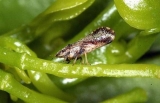
The San Mateo County Agricultural Commissioner and California Department of Food and Agriculture are beginning a survey and treatment program in response to the detection of two Asian citrus psyllids within the cities of Foster City and Redwood City in San Mateo County.
This pest is a serious concern because it can introduce and spread a deadly plant disease known as Huanglongbing. The identities of the insects were confirmed for the Foster City insect find on Wednesday January 23rd, and confirmation was received for the Redwood City psyllid on Friday February 1st, 2019. The confirmation of Asian Citrus Psyllid in the county has triggered the placement of insect detection traps throughout the area to determine the presence and extent of a larger breeding population. Citrus host plants within 50 meters of the site where the insect was trapped will be treated. Residents within the treatment area will be notified in advance and community outreach meetings are being planned.
To prevent further movement of Asian citrus psyllid in the area, the California Department of Food and Agriculture (CDFA) is establishing a quarantine regulating the movement of all citrus trees and citrus plant material. Homeowners should not move citrus trees, citrus plant parts, or foliage of citrus trees outside of the Asian Citrus Psyllid Regional Quarantine. A map of this quarantine can be found at:
https://www.cdfa.ca.gov/plant/acp/regulation.html
https://gis2.cdfa.ca.gov/Plant/CitrusQuarantines
Low populations of ACP are not in themselves harmful to citrus trees; however, Asian citrus psyllid is the only insect that can carry and transmit Huanglongbing disease. Huanglongbing is fatal to all citrus and once infected, there is no cure. A diseased tree will decline in health and produce bitter, misshaped fruit until it dies. Huanglongbing disease is not harmful to humans or animals, and though unappetizing, citrus fruit infected with the disease is safe to eat.
Because the disease cannot move without Asian citrus psyllid, it is critical to control the insect. Huanglongbing has been detected and is under eradication in areas of Los Angeles, Orange and Riverside Counties. CDFA and county agricultural officials are surveying and monitoring for these destructive pests throughout California to prevent their introduction or further movement. Researchers are looking for a cure for Huanglongbing but right now the best way to protect local trees against the disease is to eradicate the Asian citrus psyllid and avoid bringing citrus plants or clippings into San Mateo County from other areas.
“The Asian citrus psyllid combined with Huanglongbing disease is a lethal combination for all citrus,” said San Mateo County Agricultural Commissioner Fred Crowder. “With the community’s support, our goal is to eradicate Asian citrus psyllid. This both protects our state’s vital citrus industry, as well as our mature backyard lemon, orange, mandarin, lime and other mature, fruit-producing citrus trees grown at family homes throughout the region. Working together as a community we can protect and save our citrus trees.”
The state of Florida first detected Asian citrus psyllid in 1998, and the disease in 2005; the two have been confirmed in all 30 citrus-producing counties in Florida. By 2012, the Asian citrus psyllid and Huanglongbing had caused an estimated loss of over more than 6,600 jobs and $3.6 billion in economic activity in Florida. California is the second-largest citrus producer in the nation and it is important to manage these pests to maintain a viable citrus industry and prevent the loss of our residential backyard citrus.
Residents who think they may have seen the pest are urged to call the Pest Hotline at 800-491-1899. For more information on the Asian citrus psyllid and Huanglongbing disease visit: http://www.cdfa.ca.gov/plant/acp/ or CaliforniaCitrusThreat.org.